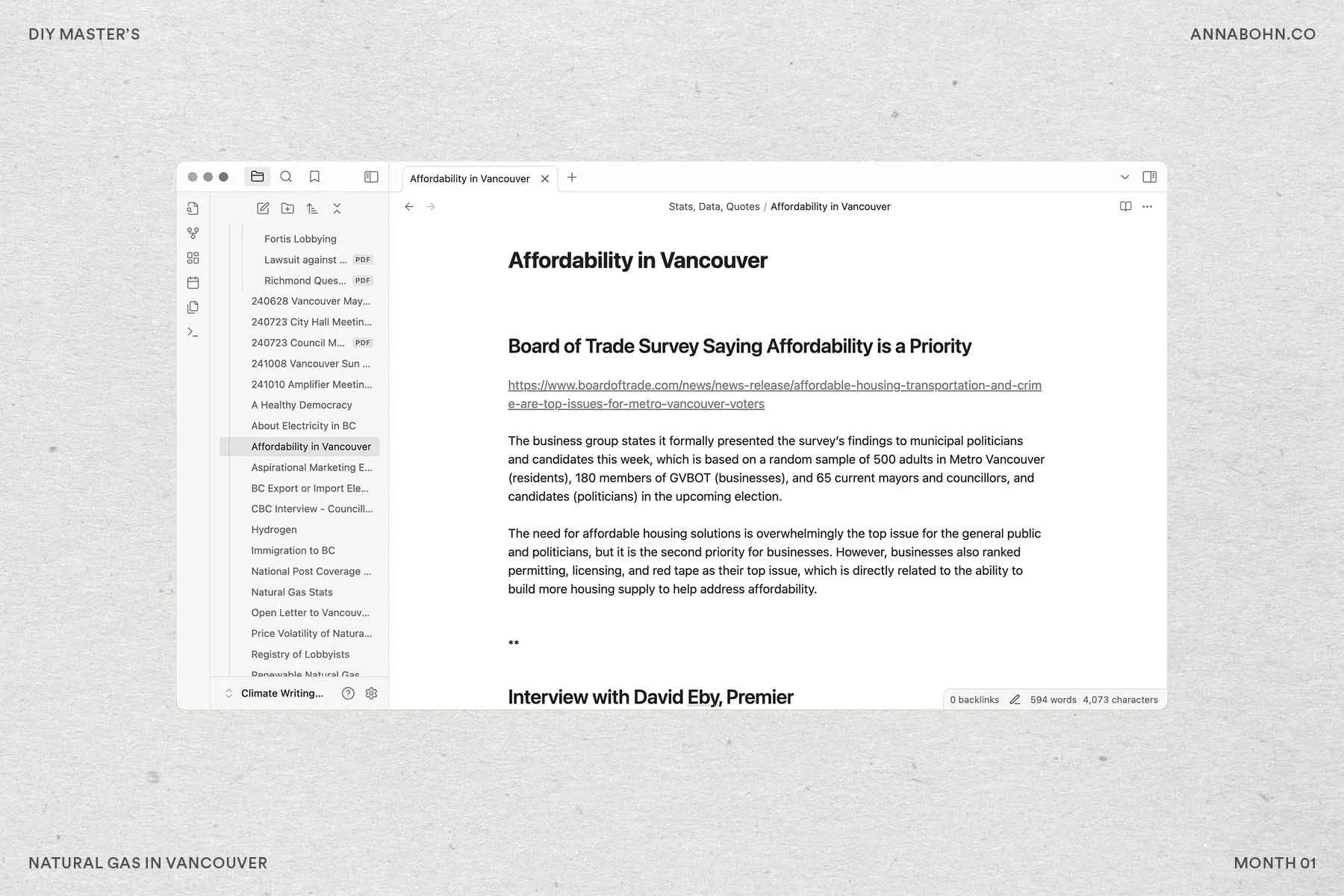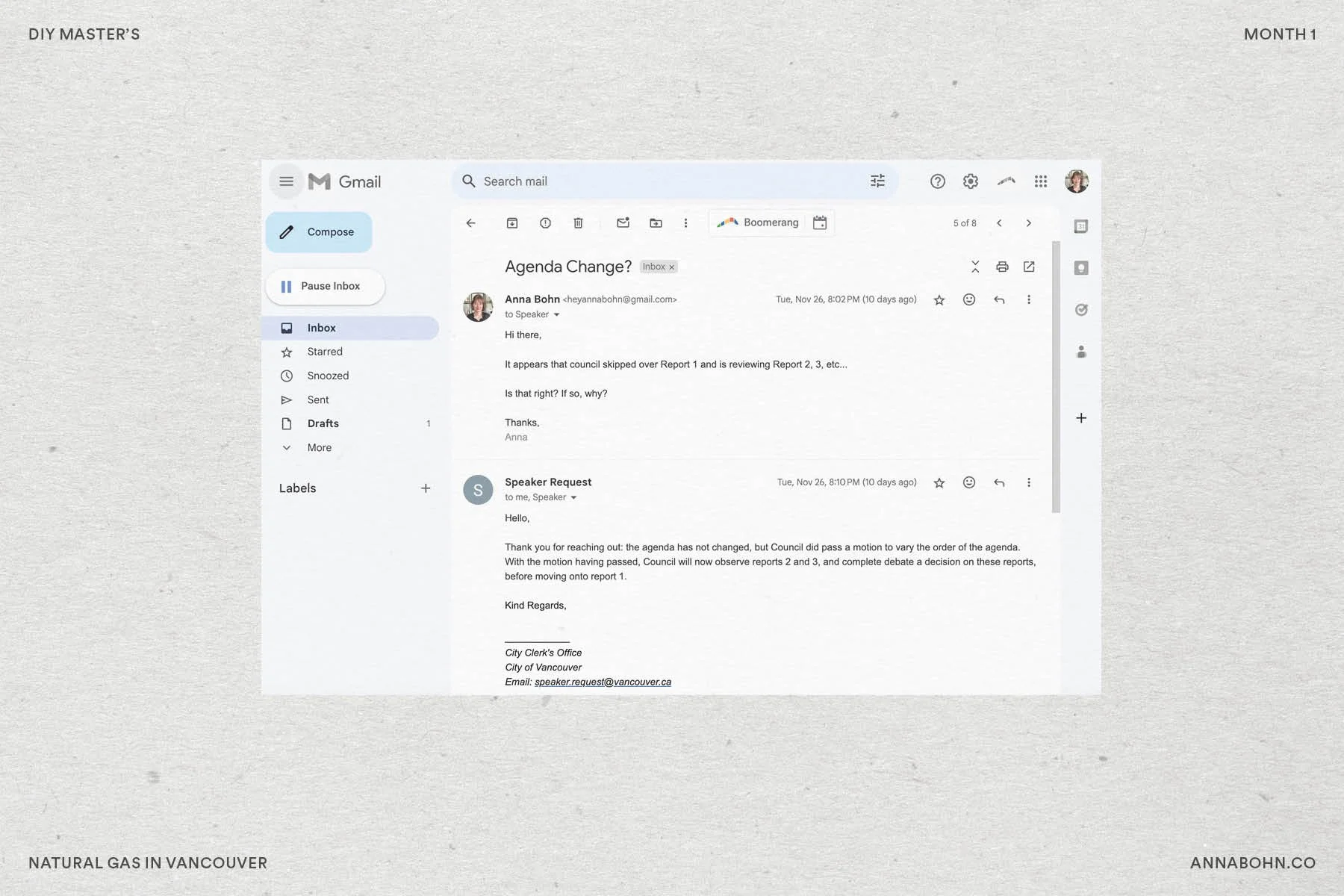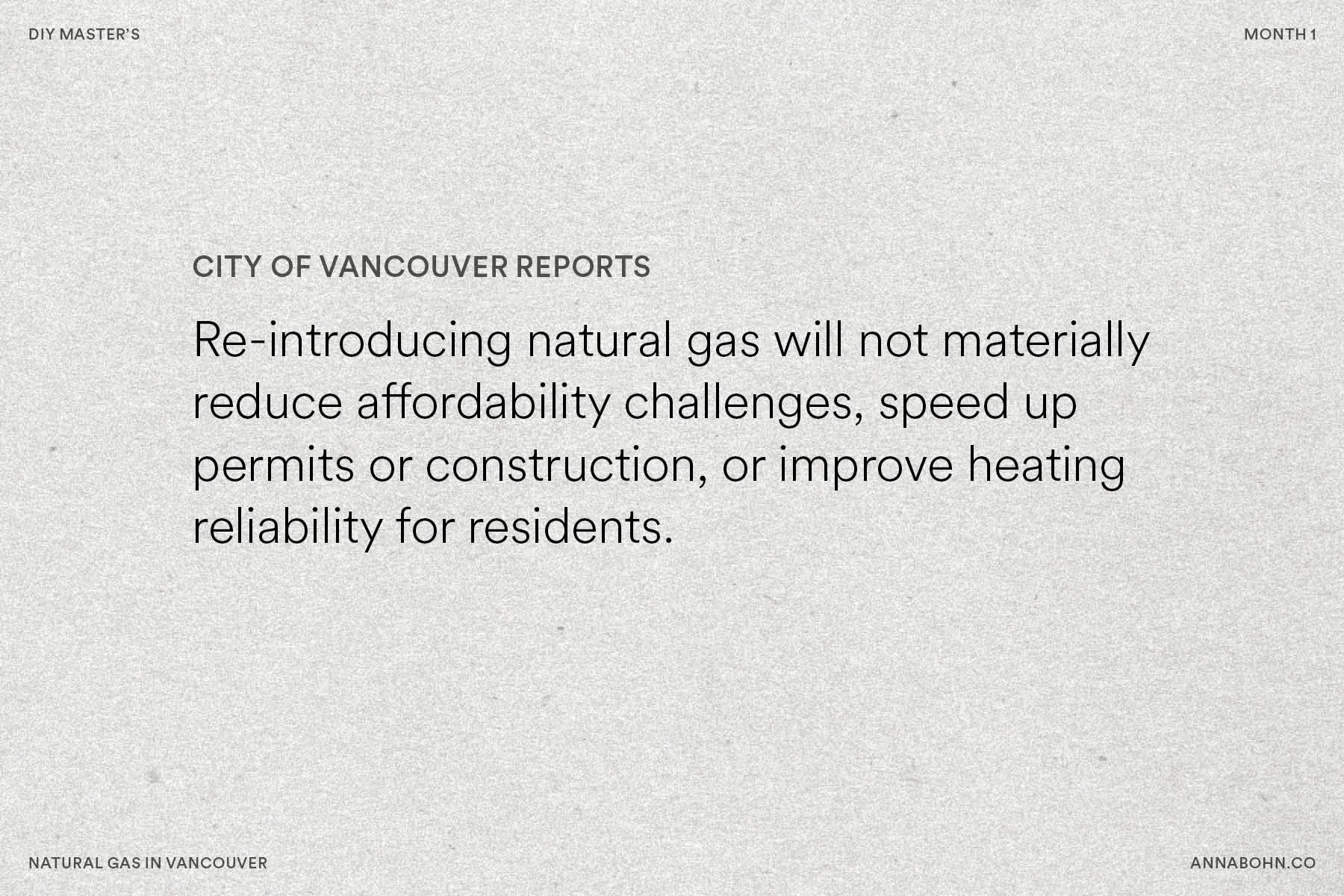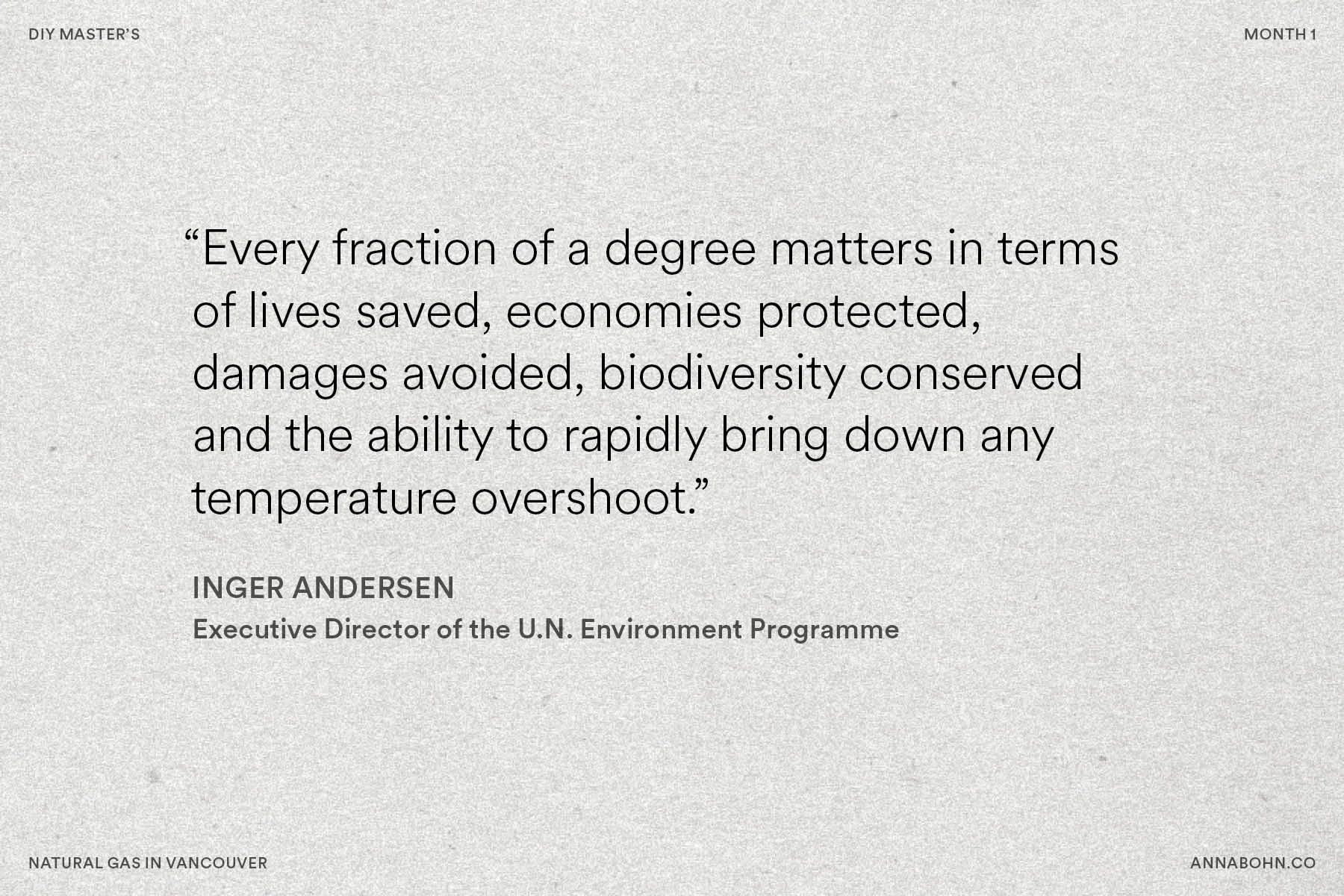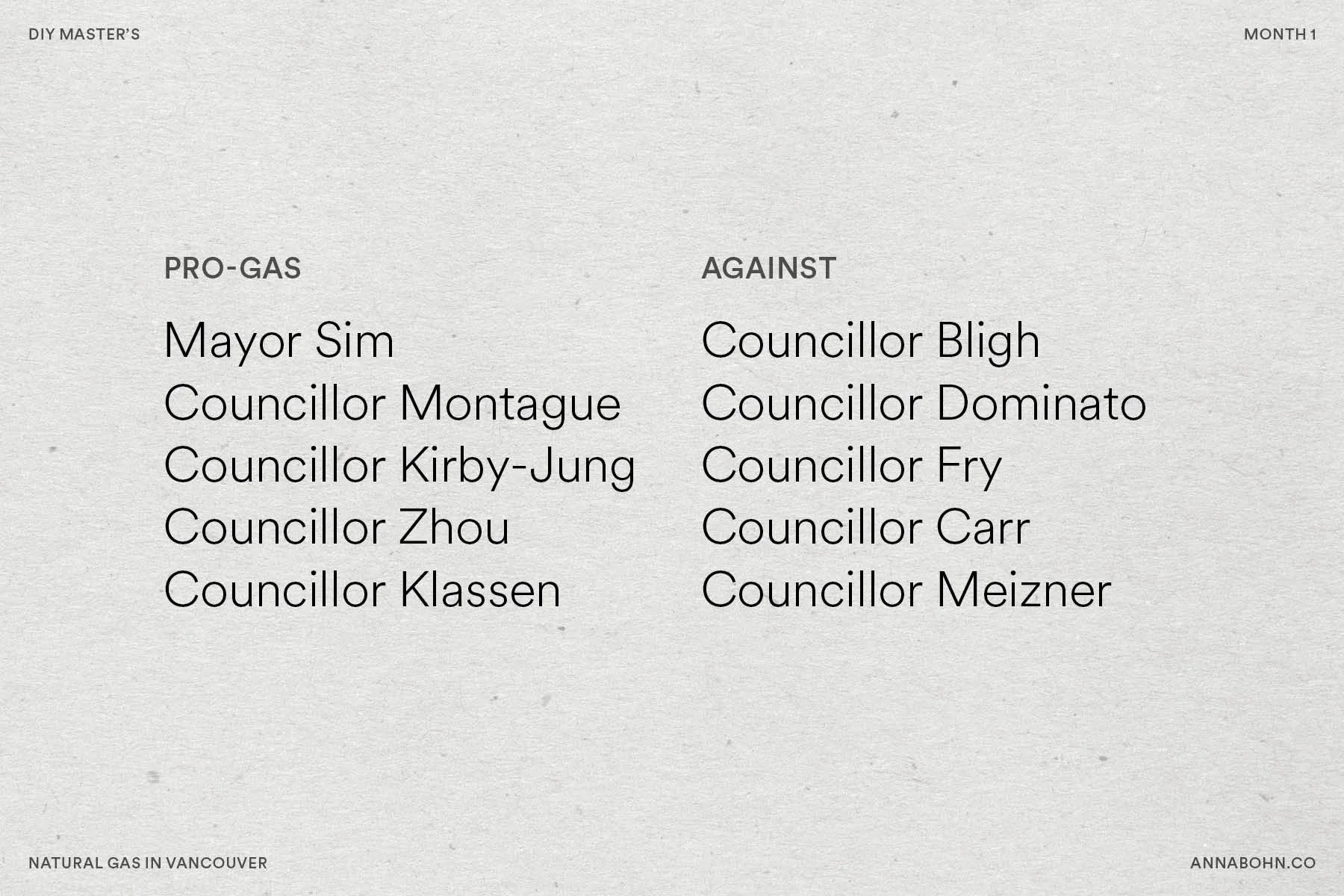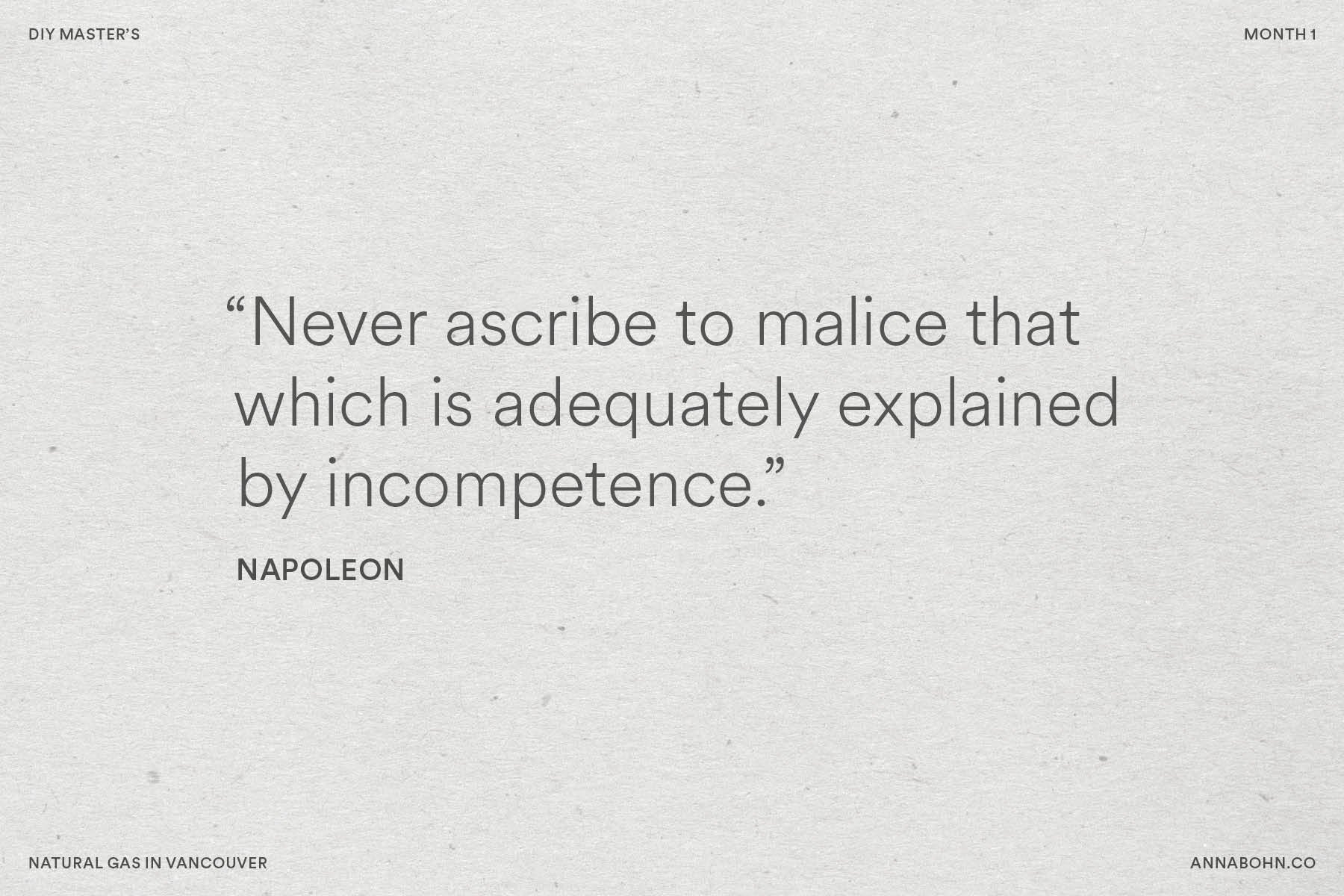Theme 1: Reflections
Natural Gas in Vancouver
It's December; the Dutch are celebrating Sinterklaas, and it's time for a new DIY master's topic. But first, I wanted to reflect on what I learned.
What I Did
To kick off my DIY master’s, I learned about natural gas. Now, this wasn't part of the original plan. Vancouver had discontinued its use—for heat and hot water—for new, yet-to-be-built buildings since 2022.
Recently, though, a group of councillors had voted to change that. Why? To improve affordability. Curious and wanting to learn more, I streamed the meeting where the decision took place.
But watching the tape, I was shocked. No sources were cited. No evidence was shown to prove this would make a difference, and if so, by how much. The mayor said electrification cost X; city staff said no, it’s Y—and no one had time to check the numbers.
At the end of Month 1, November, councillors planned to revisit the issue. So I decided to focus my time on this topic. I read interviews, articles, and council meeting minutes; before I knew it, I’d compiled hundreds of pages of notes.
Psst—I’ve just started using Obsidian for this, and it’s a game changer! Highly, highly recommend.
What I learned echoed a report later released by City of Vancouver staff:
Right now, using natural gas wouldn't speed up permitting times, save on construction costs, or cut down on energy bills.
Environmental issues can be complex, with trade-offs sometimes needing to be made for the economy, individual rights, security, and more. But this didn't seem to be one of those moments.
And with natural gas use—for heat and hot water—already accounting for at least 55% of Vancouver's footprint today, I thought: if we're going to go ahead with this, we better have a good reason.
So I started hatching plans on how I could spread the word—from petitions to a podcast.
***
The Speech
Near the end of the month, I realized I couldn't get it all done. I was sitting at a coffee shop in Boston when it hit me: I started crying, frustrated with myself and my time-management woes.
The perfect backdrop for a breakdown.
My husband happened to call, and I talked to him about it. He said I should focus on what I did, not what I didn't do, and that the best I could hope for was to do better next month. His advice is why I'm writing this reflection today.
“But,” he said. “The council meeting is still coming up. Just focus on that.”
So I did. I signed up to speak and wrote a 3-minute speech that responded to the arguments I’d heard so far (not knowing that by the time it was my turn, I'd have much more to respond to).
And at 6:30pm—Amsterdam time—on Tuesday, November 26th, I sat down at the kitchen table and streamed the council meeting via YouTube.
First, the councillors went through the agenda, approving some items quickly by consensus. Then, they voted to change the item order. The discussion on natural gas was originally scheduled first, but now, it was last. I checked the time difference. Would I speak late in the night?
Me, emailing city clerks in a panic.
I stayed glued to the screen, not knowing if the other items would take long. And I have to say—it was super interesting. The meetings follow a strict process. The mayor and councillors have to take in a lot of information—both with written reports and staff commentary—to get an idea of the big picture. They also have to listen to speakers, many of whom are self-educated (like me)—and discern what is a good argument and what not. In the age of social media, where "some guy on YouTube said so," this is easier said than done.
And quickly, it became clear who was good at their job. Some didn’t have the best verbal and written comprehension, which is a problem. Others didn’t have the skills to be open, impartial, and objective, which is a problem too.
Finally, it came time for the (now) last item on the agenda: natural gas, for heat and hot water, in new builds.
First, Vancouver city staff presented their analysis. Patrick Enright, engineer, walked councillors through whether natural gas would help with affordability.
Here’s the takeaway: it wouldn’t.
You can view the accompanying presentation here.
I wasn't surprised. But I was surprised at what happened next. Some of the councillors began providing counter-arguments—without providing sources. "Where are they getting this information from?" I wondered.
Though I was only #19 on the speakers list, I didn't get asked to speak before the meeting ended. The next morning, I rewrote my speech, again and again, based on the information presented the previous day. At draft #44, I thought I was done.
(My husband was a champion. Not only did he listen to all my arguments—and give exceedingly good feedback—he put up with me being a malestrom of anxiety for 24 hours.)
PS. I saw Inside Out 2! SO GOOD.
I didn’t get much sleep. So at 6:30pm, when the November 27 council meeting started, I made myself a strong coffee. Let's do this.
And again, the agenda items were reshuffled.
!@#$%^&
I felt like crying. I had no idea when I'd finally get to talk; if I did manage to stay awake—which was doubtful—would I be coherent?
So once more, I watched the entire city hall meeting. And at around 8pm, they started hearing from speakers on natural gas again. Over and over, I changed my speech, thinking: “She's already covered this, he's already covered that.” At first, my draft was like a stew: a little bit of everything. But I realized that, in listening to the other speakers, it can be more powerful to stick with one point—and make it clearly and confidently. Just before 9pm my time, I was next in line.
And they called a lunch break.
So of course, I rewrote my speech again. It was draft #64.
"Next up, Anna Bone—or Bohn" said the chair. "Bohn," I replied, laughing.
"Speak slowly," mouthed my husband from across the table.
I took a breath, set aside all my arguments about climate and affordability—and focused on the decision-making process instead.
Because from what I had observed, it wasn't a good process. Sources weren't provided, staff weren't given time to check the numbers—and the influence of oil and gas companies could not be discounted.
“I expect,” I said, “from my government, that you'll make decisions based on verified facts.”
“A decision like this—with huge, long-term consequences—deserves a better decision-making process.”
“Thank you,” I concluded and got quiet. The chair seemed surprised—I was probably the only one who hadn't used up the entire three minutes.
“Okay. Next.”
Formal, neutral, and very anti-climactic.
But I didn't care. I'd never spoken at city hall before! And I'd really done my best. I knew that my speech—finished five minutes beforehand—was unpolished, but it was the best argument I could make with the information I had.
I stayed on the line and listened to a few more speakers. Eventually, I tried to sleep—but couldn't. The day's events swirled in my mind, and I thought of other arguments and different, better ways to say what I had said, even though it was too late.
In the wee hours of the morning, having not slept at all, I logged onto the city hall meeting once more.
A few more speakers had their turn—both focused on the health impacts of natural gas and climate change—and then it was time to vote.
At the end of the day, councillors gave their thoughts on what they'd heard.
“All too often, governments want to address short-term issues at the expense of sustained, long-term efforts,” said Councillor Dominato. “The city isn’t a business […] As such, we need to consider multiple bottom lines, not just financial ones or the influence of lobby groups. […] Only the natural gas sector and their representatives have been advancing this agenda.”
Wow! The natural gas amendment hadn't come with sources, so I had no idea what it was based on. But something hadn't seemed right—more on that later.
“I've heard from BC Hydro, and I know what their interests are,” said Councillor Klassen. “And I've heard from Fortis BC, and I know what their interests are.” I winced—this presumed that both companies are created equal, but they’re not. More on that later, too.
“I'm concerned that if we were to re-introduce natural gas […] we would need to find more expensive ways to reduce our emissions, to make up for the emissions that would be generated,” said Councillor Meizner.
“We already pay the price of climate change,” said Councillor Carr. “About $13 million for adaptation in our 2025 budget […] and more for repair.”
“One thing I want to highlight,” said Councillor Fry, “Is that electricity is a source-agnostic system. If we need to... we can actually generate electricity with anything: natural gas, nuclear—who knows.” This was one of the arguments I had come across myself. Buildings have long lifespans—when deciding what infrastructure to build, shouldn't we go with the option that gives us the most options?
“Even if Vancouver were to shut down today, it wouldn’t make a difference,” said Mayor Sim. This, sadly, is correct. Likely, it'd make less than a 0% difference to the average global temperature. Vancouver is but a small part of the pie—and many, many of our buildings already burn natural gas today. But eschewing responsibility because of this seems like moral jujitsu. And, more importantly, every fraction of a degree matters.
“I understand we have to signal,” Mayor Sim continued, referring to Vancouver's brand as a green city, “But at what cost? [Discontinuing natural gas in Vancouver] won't have any material impact [on climate change.] But the cost [of electrification] is real: it's affordability.”
I was confused. The staff report had said re-introducing natural gas wouldn't help. And I hadn't heard anything else to suggest otherwise—other than from a handful of speakers.
“Citizens expect us to make decisions that are best for them, best for the city, and most importantly, they expect us to make decisions that are grounded in facts,” said Councillor Bligh.
I sat up, suddenly wide awake. Was I imagining things? Had she actually paid attention to my speech?
Then came the vote.
It was a tie. And a tie meant the motion didn’t pass. The discontinuation of natural gas for heat and hot water in new builds would be upheld.
The results of the November 27, 2024, vote.
Tears streamed down my face. I was exhausted, near-delirious, and happy. Now, with some resolution, I collapsed into a peaceful slumber.
***
The next morning, I read more about what happened. Earlier in the year, the decision to re-introduce natural gas had passed by one vote. Yesterday, it was a tie. Someone had changed their mind—who was it?
Councillor Bligh. The person who referenced what I had said.
More tears followed. (Again, my husband was a champion.)
While working on this speech, I had no idea if it would make a difference—so I tried to cultivate the mindset that it didn’t matter. With big world issues, so much is out of one's control; all one can focus on is one's effort.
So, hearing Councillor Bligh echo my words was something I never expected. I didn’t think I alone had changed her mind; no, that was clearly a group effort. But it did seem proof that one person can have an impact. It felt as if the universe was giving me a small sign: “Keep going.”
***
What I Said
If you're curious, here's the gist of what I said at city hall—with minor edits. One paragraph, in italics, was added later (after some reflection and proper sleep).
***
Hi, my name’s Anna Bohn, and I’m a Vancouver resident and business owner. I’m calling in today to oppose the use of natural gas in new buildings. Thank you Mayor and council for the opportunity to speak.
First, I just want to say that I applaud any attempt to make this city more affordable. And when I heard about the July 23rd amendment, I was curious how it would help.
But watching back the council meeting, I was shocked. No sources were cited. No one had time to check the numbers. The whole process—last minute, going to a vote without verifying the claims—was... rough.
So I still don’t know what this amendment was originally based on. But I'm really hoping it didn't come from oil and gas.
Many oil and gas companies don't have the best track record for objectivity. For example, Fortis. A couple of years ago, they made the news for redacting a report called "BC Renewable and Low-Carbon Gas Supply Potential Study." When it was first published, the report said that, in the lower mainland, electric heat pumps were “six to eight times more efficient than heating with gas.” 9 days after publication, Fortis redacted that section. When the redaction was questioned by several municipalities, Fortis said it was "out of scope." They’re also currently being sued for greenwashing their RNG claims.
In Canada, there is a lot of money, lobbyists, and think tanks working for the oil and gas industry. And as a communications professional, I can tell you: pairing natural gas with affordability is really good marketing. And it's obvious why—people are struggling. I mean, if you're a Vancouverite, you care about affordability. I think everyone at city hall and on the line can agree about that.
But even if this amendment isn’t backed by oil and gas, the truth still matters. We live in a world of disinformation created in part by new communication technologies. A democracy is like a network—but when you flood it with information, the truth sinks to the bottom. The truth is expensive and time-consuming to procure—and complicated. And our 200,000-year-old brains prefer simple, emotional stories that fit with our existing worldview. More than ever, it's important to examine our biases and verify the facts.
In summary, I'm opposing recommendation B because I think we don't have the evidence to back it. I expect, from my government, that you will make decisions based on verified facts. A decision like this—with huge, long-term consequences—deserves a better decision-making process.
***
Ps. The paragraph I added was inspired by Noah Yuval Harari’s new book, Nexus—he’s a historian/futurist hybrid best-known for Sapiens.
***
Month 1: How Did I Do?
In the first month of my DIY master’s, I was far too ambitious. This is a recurring fault of mine; I have mixed feelings about it since aiming high has gotten me far—but I fail often. And this month, I had lots of ideas that didn't get executed.
Here's what I wanted to create:
A petition for Vancouver residents, to be sent to city hall before the council meeting. I wrote the text but never hit publish.
A petition for those who lived elsewhere. Many have made the argument that since Vancouver is a climate leader, its actions matter beyond its borders. I hoped that by showing council that the world was watching, they'd make a careful choice. I didn't start this petition.
A vodcast. I spent about a month learning about natural gas in BC, and felt I'd learned a lot. I set up a call with my friend John to tell him all about it. We recorded ourselves chatting, laughing, and—occasionally—gasping in shock. I wanted to publish clips of this on Instagram, Facebook, and Tiktok—but didn't find the time to edit the take. PS. Still, the thought of spending hours in AfterEffects paralyzes me. Does anyone know to expedite the process?
An email to council. I'd originally hoped to write a letter but got lost in exactly what to say. I wrote at least a dozen drafts. Ultimately, I used the City of Vancouver feedback form to express my opposition. In an email exchange with the Vancouver City Clerks, I understood that in this format, only 'for' or 'against' is counted, so I felt less pressure to get my words right. I never sent the email.
Connections with others. "If you want to go fast, go alone—but if you want to go far, go together." —African Proverb. I knew that others were working on this issue, and wanted to see if I could help. But there wasn't an easy way to find those people, or get in touch. I haven't started on this project, but have some ideas.
Messages to friends. I'd posted to social media but intended to reach out to friends directly. First, I held myself back by thinking I hadn't properly organized my arguments yet. Who would take me seriously if I hadn’t listed my sources? Then, I worried about bringing up politics where they didn't belong. In the end, I didn't send a single message.
Many of the failures came from fear, and I need to work on this for Month 2. Here's what I did create in my first month:
A website to house my DIY master's project: annabohn.co
A post outlining the master's, posted on LinkedIn, Facebook, and Instagram.
A post outlining the first month's theme, and a call to submit comments to city council as I had done—on LinkedIn, Facebook, and Instagram.
A 3-minute speech to the mayor and city council.
***
The Writing Process
In general, I underestimated a few things:
How much time writing takes me.
That I’d have less time overall, seeing as I went on a 10-day trip to Boston. I also had horrendous jet-lag (both ways!)
How much time I need to get it right. My first drafts are often angry and upset—and readers can tell. To connect with people, I need to let that energy pass and rewrite when I was in a loving state of mind. This means I can't publish on the same day—ideally, I need to let go, reflect, read aloud, and edit—which takes 3 days minimum.
My hesitations about posting. Over and over, I asked myself: "Does anyone care?" And, "What do I know?" But I'm getting wise to these voices—they are Resistance.
The de-prioritization of political content. Meta is downplaying news, choosing to promote entertainment instead. LinkedIn is experimenting with allowing users to hide political content. My second post—asking people to contact city hall—got a fraction of the views my first one did. Now, this could be due to many things: social media's slot machine mechanisms, the quality of the posts, and more—but it made me rethink how I was going to share what I’d learned and if others would be open to reading it.
To top it off, it was my first time trying to write systematically. And my process was far from polished. Here's what I'm going to try to do from now on:
Start and finish one thing at a time.
In Month 1, I signed up for an accountability program that required 15 minutes of original writing a day. The goal was to write as much as possible, without editing, until the timer went off. The program is great, but the result not so much—I ended up with spurts of stream-of-consciousness that needed a lot of work. When I look at what I posted—not including different versions of the same piece—vs. what I wrote, I published less than 5% of the total. In Month 2, I want to improve that.
Capture ideas whenever they come.
Paragraphs would unfurl themselves in my mind at the most inconvenient times. Walking to the grocery store. In the shower. On a run. This reminded me of poet Ruth Stone, who felt as if poems were galloping across the landscape as she tended the fields; she'd run to the house in a mad dash so she could capture them before they passed. At first, I tried to wave these paragraphs away, thinking I'd recall them when it was time to write. But that doesn’t work. There's something magical about the mind when creating ideas—I think of mine as a river, slowly eroding stone into sand—but not recalling them. I noticed that most of the time, these paragraphs came to me when walking—perhaps because that our brains may have evolved for movement. So I created an iPhone doc and dictated to it, grabbing my phone mid-jog or muttering sentences while grocery shopping. I tried to keep in mind that, above all else, this was my job—and not errands, cleaning, or anything else.
***
The Political Process
Watching council meetings for the first time also taught me a lot about municipal government.
First, writing to city council works. Councillors received over 750 letters about natural gas, some from real estate developers who just didn't see how it would aid affordability. The mayor and council can’t know everything, and hearing from local experts helps.
So does speaking at city hall. By Councillor Fry’s count, 104 people spoke in total, 13 of which were pro-gas (including one rep from Fortis). This means that 87.5% of speakers were against.
But I also saw how easy it was for people to get misled. For example, one of the councillors said that people should be able to choose how they cook their food. Vancouver had never banned natural gas for cooking, but this comment caught like wildfire. Top that off with the ubiquity of research a-la-social-media, and it’s easy to get stuck in a storm of misinformation.
In my work as a communication designer, I've seen how easy it is to shape a story by omission. By selectively showing some stats—in an ESG report, for example, or a pitch deck—one can control the narrative. And though it isn't lying per se, it's not the full truth. The redacted FortisBC report I mentioned in my speech is an example of this. What you communicate is important.
How you communicate is important, too. One speaker commented on the mayor’s advisor’s connections to natural gas companies. When she followed it up with, “The mayor doesn't care...” the chair cut her off. “Stick to the topic, please,” he said. “But this is relevant,” she countered. “It might affect their vote.” She was not allowed to continue that line of thought, underscoring the importance of choosing one's words wisely; when she stated the facts—the mayor's advisor had connections to natural gas—no one could contend that. But when she said the mayor didn't care, this was an assumption that reflected poorly on his character and would not be tolerated.
It wasn't only word choice. I noticed that the council was more amendable to speakers who started with a smile and were friendly, empathetic, and conciliatory. It's not surprising when you think about it: when I feel attacked, I shut down; I'm not open to the other person's perspective. In "Ego is the Enemy" by Ryan Holiday, I read that you should always allow your opponent to save face. That way, they can acquiesce to your ask without feeling shame. At city hall, some speakers did a better job of that than others.
Which brings me to my next point.
This quote is one of my favourites; I reference it often. Insert “recklessness,” “disorganisation,” or “human fallibility” for “incompetence,” and it works just as well. But I didn't heed these words this time around.
When I first was researching natural gas and found no evidence that it would improve the cost of living, I assumed the worst. I thought that, perhaps, the idea had been proposed by real estate developers for their own benefit.
In an interview with CBC, Councillor Montague mentioned that a friend had two rental suites—one powered by natural gas and one powered by electricity. The first one was cheaper to heat, they said.
Regardless of whether or not this was true, the idea that saving developers and landlords money would make homes cheaper didn't seem right. Cost is not the only thing that determines price—there’s also demand. And looking back, this important point was missing from much of the discussion at city hall.
But as I continued with my research, I started to wonder if there was more to the story. Councillor Montague said that he'd consulted with both BC Hydro and FortisBC—a sentiment later echoed by Councillor Klassen. That sounded reasonable; aren’t they different sides of the same coin? It was only when I googled both that I realized: no.
BC Hydro is a government-owned crown corporation. FortisBC is a for-profit company, part of a 22 billion-dollar company with operations all over North America. (When I told a friend, he gasped, “But it has ‘BC’ in the name!”) They also make money based on the volume of gas delivered. And to me, these differing motivations matter.
To top it off, Councillor Montague met with a FortisBC lobbyist, and Mayor Sim had an advisor with ties to natural gas. Was the fossil fuel industry behind all this?
I wasn’t the only one connecting the dots. Later, at city hall, speaker after speaker accused the mayor and others of being manipulated by oil and gas. So much so that one pro-gas speaker declared: "And I'm not a lobbyist!"
But that day, seeing the faces of those who voted for natural gas, I didn't think they had malicious intent. I believe they wanted to build homes and help people. And when someone came to them with an idea on how to improve affordability, they listened, but perhaps they weren’t skeptical enough when they got the evidence to support it from a questionable source.
What’s Next
I've read a lot about misinformation seeded by the fossil fuel industry. But in listening to the council meetings, it became clear that it was more complicated than that. With social media algorithms optimized for engagement—and promoting polarizing content as a result—comes a more populist perspective: that we should always trust individuals over institutions. And with people being so fallible—biased, limited in understanding, and unable to research at the scale required—so many of us are being misled. Not only that, but we've become polarized.
So next month, I'll be focusing on communication: new information technologies like social media and their effect on the public discourse; best practices for connecting with someone on climate across party lines; and how this connects to truth and trust—which stable societies are based on.
But for now, I’ll keep going.
—Anna

